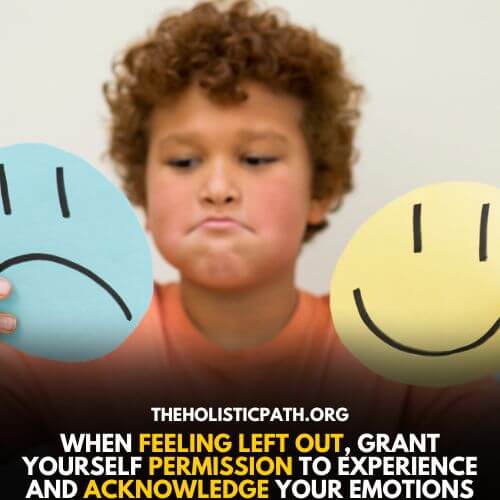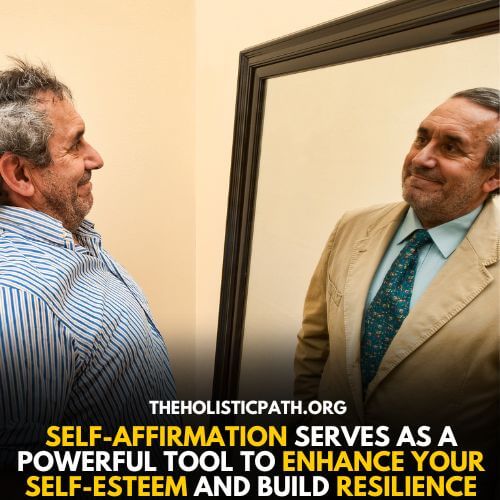Feeling left out is like an unwelcome guest crashing the party of your emotions. It’s that sinking feeling when your pals excitedly chat about an event you weren’t included in, or when your work buddies consistently forget to loop you into their lunch or happy hour plans.
The uncertainty lingers, leaving you to ponder whether it’s an accidental oversight or a deliberate exclusion. This mix of emotions—sadness, frustration, and a touch of confusion—can leave you reeling.
We’ve all tasted the bitterness of being socially excluded at some point, but fear not, this article aims to serve up insights and practical tips to help you navigate these tough emotions and regain your balance when you’re left feeling like the odd one out.
Why Do I Feel Left Out? Exploring the Layers of Emotion
Feeling left out can trigger a range of emotions, going beyond the immediate sense of exclusion. As psychotherapist Tina Tessina notes, deliberate or not, being left out communicates a message.
When individuals we admire or wish to feel close to exclude us from conversations, activities, or invitations, it implies that we might not be important to them. This can evoke feelings of being unimportant, disregarded, or even invisible in their social sphere.
The emotional layers unfurling from feeling left out are extensive. There’s the initial sting of exclusion, leading to a deeper emotional landscape that includes feelings of rejection, unworthiness, and self-doubt. It can also stir up envy or resentment towards those included, further complicating our emotional state.
Moreover, the experience of feeling left out can influence our self-perception, impacting our future interactions and social behaviors. It serves as a reminder of our fundamental need for connection, acknowledgment, and mutual respect within human relationships.
10 Common Signs of Being Left Out
Feeling left out is a complex emotional experience that often manifests through various telltale signs. These signs serve as indicators of an individual’s perceived exclusion or detachment from social groups.
Recognizing these signs is essential in understanding and addressing the emotional impact of being left out in social settings. Here are some key indicators that may signal someone is feeling left out:
| Signs of Being Left Out | Description |
|---|---|
| Feeling Excluded | A persistent feeling of not being part of group activities or conversations. |
| Isolation | Withdrawal from social interactions or events, distancing oneself from others. |
| Being Overlooked | Others seem to ignore or not notice your presence or contributions. |
| Lack of Invitations | Not receiving invitations or being excluded from gatherings or events. |
| Disconnection | Feeling disconnected from social networks or friend groups. |
| Decreased Communication | A noticeable decrease in communication and interaction with friends or peers. |
| Low Self-Esteem | A decline in self-esteem and self-worth due to perceived exclusion. |
| Jealousy or Resentment | Feeling envious or resentful towards those who are included or seem to be preferred. |
| Sadness and Emotional Distress | Frequent feelings of sadness, anxiety, or emotional distress related to being left out. |
| Self-Doubt | Questioning one’s likability or worth in social relationships. |
These signs can vary from person to person, and experiencing one or more of these signs may indicate that someone is feeling left out in a particular social context.
Is It Normal to Feel Left Out a Lot? 3 Things To Consider
Feeling left out occasionally is a common experience in various social settings and doesn’t necessarily indicate a significant issue. It’s normal for individuals to occasionally experience exclusion or a sense of being left out in certain situations, such as group gatherings, social circles, or workplace interactions. However, if someone consistently feels left out in most social settings, it might be a cause for concern or reflection.
Several factors can contribute to frequently feeling left out:
- Social Dynamics: Some social groups might inadvertently exclude certain individuals due to established dynamics, common interests, or pre-existing relationships within the group. This exclusion can lead to someone feeling left out frequently, even in seemingly inclusive environments.
- Self-Perception: One’s self-esteem, social skills, or personal experiences can play a role. Those with lower self-confidence might interpret neutral actions as exclusion, leading to a heightened sense of being left out even when not intended.
- Past Experiences: Previous instances of being excluded or a history of feeling left out can influence how an individual perceives and interprets similar situations in the future. Negative past experiences can amplify feelings of exclusion.
While occasional feelings of being left out are normal, consistently experiencing this might indicate a need to address underlying issues. Frequent exclusion can impact one’s mental health, self-worth, and overall well-being.
It might be beneficial for individuals experiencing persistent feelings of exclusion to reflect on these experiences and consider seeking support or professional guidance to navigate and understand these emotions better. Working on self-confidence, and communication skills, and exploring different social circles could also help in reducing these feelings of being left out.

How to Deal With Being Left Out? 13 Best Solutions
If you’re feeling left out by your friends, here are a few things you can do to deal with the feeling:
1. Embrace Realistic Thinking
Amid feelings of being left out, it’s essential to adopt a balanced perspective. Instead of catastrophizing or assuming the worst, acknowledge that this sense of exclusion is transitory. It does not define your worth or forecast future social interactions. Recognize that social dynamics are intricate and influenced by numerous factors.
Understand that one isolated incident does not encapsulate all your social encounters.
Embracing this realistic viewpoint can alleviate the weight of the present experience and allow you to approach future situations with a more open mindset. Remember, this instance is fleeting, and it doesn’t shape your inherent value or your potential to connect with others in different contexts.
2. Acknowledge and Validate Your Emotions
When feeling left out, grant yourself permission to experience and acknowledge your emotions without judgment. Validate these feelings as a natural and valid response to the situation. This self-compassionate approach builds emotional resilience.
Understanding that emotions are an integral part of human experience doesn’t equate to weakness.
By validating your emotions, you create space for understanding and processing them, fostering a healthier mental landscape. This acknowledgment forms a foundation for self-acceptance and personal growth, enabling you to confront and process your feelings rather than suppressing or denying them.
3. Give Others the Benefit of the Doubt
Rather than assuming intentional exclusion, consider that there may be reasons beyond your awareness. Embrace the idea that it’s not always about you; others may have their own challenges and reasons for their behavior.
Extending this benefit of the doubt allows for understanding and empathy, preventing assumptions that could deepen feelings of isolation. Recognizing that everyone faces challenges or distractions at times helps you approach situations with compassion and an open mind, reducing the impact on your emotional well-being.
4. Rewrite Your Inner Story
Reframe the narrative about social exclusion. Instead of focusing on rejection, highlight your self-worth and unique qualities.
Remind yourself of past successes and the positive contributions you offer in relationships. This deliberate restructuring of your inner narrative empowers you to acknowledge the diverse aspects of your personality and the positive impacts you bring to social interactions.
This self-affirmation helps fortify self-esteem and fosters a more resilient attitude. Reflect on your accomplishments and the value you’ve brought to various scenarios, allowing these reflections to shape your self-perception and affirm your social worth.
5. Strengthen Your Self-Confidence
Invest time in fortifying your self-confidence through a deliberate acknowledgment of your strengths and achievements. Self-affirmation serves as a powerful tool to enhance your self-esteem and build resilience when confronted with social exclusion.
Take stock of your talents, accomplishments, and the qualities that make you unique.
Celebrate your successes, both big and small. This practice can help instill a sense of self-assuredness, reminding you of your intrinsic value, even in the face of temporary social setbacks.

6. Remember That Feelings Are Temporary Sensations
It’s important to acknowledge that the sting of being left out is a passing sensation. Just like any other emotion, it will eventually subside. This perspective can give you the strength to endure the discomfort with patience and self-compassion.
Understanding that these emotions are not a permanent state of being allows you to navigate the experience with a sense of resilience. Remind yourself that, in time, the intensity of these emotions will naturally diminish, leaving space for healing and growth.
7. Take a Break from Social Media
Consider implementing a social media cleanse to reduce your exposure to potentially distressing content. Social media platforms can often exacerbate feelings of exclusion, as people typically showcase their most positive moments.
A break from social media can offer a much-needed respite for your emotional well-being.
During this hiatus, you can focus on connecting with the real world, practicing self-care, and reducing the influence of virtual interactions on your emotional state.
8. Explore New Interests and Distractions
Engage in fresh and intriguing interests or hobbies to distract yourself from the feelings of social exclusion. Venturing into unexplored territories presents a rejuvenating way to shift your focus and discover new sources of happiness and connection.
By immersing yourself in these activities, you can redirect your thoughts and energy towards self-improvement, personal growth, and the pursuit of genuine fulfillment, which can help counteract the effects of feeling left out.
9. Embrace Your Emotions, Don’t Suppress Them
It’s perfectly okay to experience the full range of emotions that come with feeling excluded. Trying to push these emotions aside often complicates the situation. Instead, confront your feelings openly.
Allowing yourself to acknowledge and fully experience these emotions is a healthy way to navigate through them.
By doing so, you provide yourself with an opportunity to understand and process these feelings. This process serves as a constructive means to naturally ease the intensity of these emotions over time. It’s an essential part of self-care, nurturing your emotional well-being and fostering a healthier relationship with your feelings.
When we acknowledge our emotions and allow ourselves to feel them, we grant ourselves permission to process these feelings without judgment. This self-compassionate approach helps build emotional resilience and aids in the natural ebb and flow of emotions.
By facing our emotions head-on, we grant ourselves the chance to heal and grow. It’s about recognizing the validity of our emotions and allowing ourselves the time and space to work through them constructively, promoting personal growth and a healthier emotional landscape.
10. Treat Yourself to a Solo Outing
Ever thought about setting aside a special day just for yourself? Plan an outing, whether it’s a fun adventure or a cozy night in. Engaging in activities you genuinely enjoy—be it a delicious meal at your favorite spot, an entertaining movie night, or a leisurely stroll—is a beautiful way to express self-love.
This isn’t about being alone; it’s about cherishing your own company and reinforcing your self-worth and significance. Taking time for yourself in a deliberate and enjoyable way is a profound act of self-care.
It’s a reminder that your happiness and well-being are essential, regardless of external circumstances.
11. Reevaluate Your Availability and Communication
Misunderstandings sometimes lead to unintended exclusion. Take a moment to reassess how well your friends understand your availability. Openly expressing your willingness to participate in social activities can bridge any gaps and prevent unintentional exclusion.
It’s about ensuring that everyone’s on the same page, fostering a more inclusive and understanding environment. Clear communication not only helps avoid misunderstandings but also nurtures a supportive social atmosphere where everyone feels valued and included.
Clear and transparent communication regarding your availability is vital in ensuring a harmonious social circle.
By openly expressing your interest and availability for various social activities, you create a welcoming and inclusive environment. Ensuring that everyone is aware of your willingness to participate encourages a more considerate and cohesive social setting. It’s about fostering an environment where everyone feels included and valued, reducing the chances of unintended exclusion and misunderstandings.
12. Initiate Social Plans
Why wait for an invitation when you can set the tone for something enjoyable? By taking the lead and organizing social events, you not only engage in activities that bring you joy but also cultivate an inclusive environment where everyone feels valued and involved.
It’s about being proactive and creating moments where everyone feels included.
Taking the initiative to plan social events is an empowering way to ensure that everyone feels welcome and part of the social circle. It fosters a supportive atmosphere where individuals feel included, appreciated, and empowered to contribute to the social dynamics.

13. Expand Your Social Circle
Meeting new people introduces exciting new perspectives and opportunities. It’s a chance to connect with individuals who share your interests and values, providing a fresh avenue for forging connections.
Building new friendships opens up an array of potential connections, making you feel more included and appreciated for who you are. Expanding your social circle isn’t just about meeting new people; it’s about broadening your horizons, fostering diverse interactions, and finding a sense of belonging and acceptance in various social circles.
What Is the Trauma of Feeling Left Out?
Experiencing the trauma of feeling left out can deeply impact an individual’s emotional well-being, leaving lasting effects that extend far beyond the immediate sense of exclusion. The emotional distress resulting from exclusion can be profound, sometimes resulting in a form of psychological trauma.
First, the feeling of being left out often generates a persistent emotional wound, leading to a range of negative consequences:
-
Emotional Distress: The trauma of feeling left out triggers emotional distress that can manifest as persistent feelings of sadness, anxiety, or even depression. The ongoing sense of exclusion can significantly impact one’s mental health, leading to a diminished sense of self-worth and belonging.
-
Social Isolation and Self-Doubt: Individuals who consistently experience exclusion might withdraw from social interactions. This self-imposed isolation can further perpetuate feelings of being unworthy or unlikable. It can instigate a cycle of self-doubt, influencing their perception of self and their ability to engage in healthy social relationships.
The trauma of feeling left out can be quite pervasive and affect various facets of a person’s life. Such an experience can lead to a persistent fear of rejection, causing individuals to erect emotional barriers as a defense mechanism.
This fear may prevent them from seeking new social connections or engaging in social activities, hindering their overall well-being and growth. Furthermore, the trauma of feeling left out can often have long-term implications, impacting future relationships and potentially leading to challenges in forming trust and intimacy with others.
This emotional trauma also affects self-esteem and can influence decision-making, leading individuals to constantly seek validation or approval from others, impacting their autonomy and self-assurance. Addressing and healing from the trauma of feeling left out involves building self-awareness, engaging in self-care, and seeking supportive networks to counteract the negative impact of exclusion and gradually rebuild a sense of belonging and self-worth.
Conclusion
The experience of feeling left out is a universal emotion that can affect anyone at different stages of life. Acknowledging the impact of exclusion on one’s mental health and well-being is crucial. It’s important to foster inclusivity, empathy, and understanding within our communities to create environments where everyone feels valued and supported. By cultivating a culture of acceptance and compassion, we can alleviate the pain of exclusion and create spaces where everyone feels a sense of belonging and connection.
